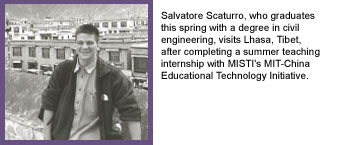 
 
Starting next fall, MIT students will have the opportunity to see their international experience reflected on their diplomas.
Students at the Institute have long had the option of an international experience, either through an internship with the MIT International Science and Technology Initiatives (MISTI) in China, France, Germany, India, Italy, Japan, and Singapore, or through international study programs on campus such as the Cambridge-MIT Institute (CMI). But while these programs excel in preparing students for their study abroad, faculty members—including MISTI Director Suzanne Berger—felt that they were missing out on an opportunity to help returning students integrate their international training into the rest of their MIT experience. This perception was reinforced by feedback from students, including alumnus Tony Sun, ' 73, now managing general partner of Venrock Associates, a venture capital firm in Menlo Park, California.
MIT's new Minor in Applied International Studies, sponsored in large part by Sun, seeks to address this issue. The program was initiated by Berger, Associate Director of MISTI Bernd Widdig, and Richard Samuels, Director of the MIT-Japan Program. The new minor integrates international learning into MIT's curriculum through a six-subject course of study organized around three key areas: language and culture classes; courses on politics, history, and international relations; and international experience. The international element will comprise an internship, a study-abroad, or a research-abroad component, and will be primarily coordinated by MISTI. In addition, students will participate in a seminar on Working in the Global Economy after returning from their international study.
Widdig believes that this opportunity has value for students across the Institute. "Traditionally," he explains, "the idea was that people who study history, foreign relations, or a foreign language should go abroad. But we believe that it is crucial for our engineers of all types, and for our scientists, to spend some time abroad."
Berger concurs, adding, "The education of an MIT student today really requires acquiring the capabilities that will let that person be a learner and a contributor in global knowledge centers. We want to give people the skills that will allow them to be effective participants in the global economy."
top
back
|
|